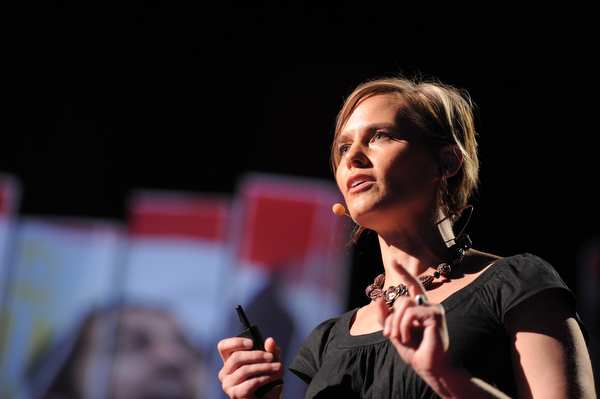Photo: James Duncan Davidson
Jennifer Pahlka is the founder and executive director of Code for America, an organization she describes as being like Peace Corps for geeks, “only instead of sending people to the third world, we send them to the wilds of City Hall.”
The fellows’ mission, should they choose to accept it, is to show government what’s possible via technology. She shows a picture of a fire hydrant in Boston that was only rarely dug out when it snowed. One of the Code for America volunteers built an app to let people commit to digging it out. It’s only a small product, she acknowledges, yet its impact has been viral. Someone in Honolulu has adapted the app to care for tsunami sirens; Seattle has adopted it to get people to clear storm drains; Chicago is using it to get people to sign up to clear sidewalks when it snows. Nine cities have signed up: the app’s influence has spread organically and without friction. And that’s not normally how it goes in government. She mentions another project helping parents get their kids into the right public school. In the real world, she was told that would have taken two years and cost $2 million. The Code for America fellow cranked it out in 2.5 months.
Yet the main theme of Pahlka’s talk is not to talk about apps. Those are just the start. Instead, she implores the audience to engage with government, not give up on it. Sure, we can be frustrated, but we can’t give up. “Government is about doing together what we can’t do alone.” And government, too, is how we tackle people’s possum problems. What on earth does she mean? Simple. She means someone who calls a city helpline to report a possum in a trash can. In Boston, someone posted just that problem to the app Citizens Connect. A neighbor saw the post and responded: “Located trash can. Possum? Check. Living? Yep. Turned the trash can on its side. Walked home. Good night, sweet possum.” As Pahlka describes it, it’s a great example of digital meeting physical–and of government getting in on crowdsourcing. And that’s how we should think of government, as a platform to connect people and thereby strengthen communities.
“We have to make bureaucracy sexy,” she says to an admittedly lone whoop from the audience. Instead of despising bureaucracy and government, we should consider how we interact with an institution that, after all, acts on all our behalves. “We can’t do without government, but we do need it to be more effective.” Inspired by the way in which Code for America fellows have applied themselves, she sees the apps they are creating as “little digital reminders that we’re not just consumers of government. We’re more than that. We’re citizens.” And she closes with a provocative question: “When it comes to the big important things we need to do together, are we just going to be a crowd of voices or a crowd of hands?”

Comments (13)
Pingback: American Steroids
Pingback: A Civic Stack Thought Experiment | Code for America
Pingback: Code for New York City | Code for America | The New York City Deal
Pingback: Code for New York City | Code for America
Pingback: Programmering for samfunnet og adopsjon av hydranter
Pingback: 03.13.2012 Doing better with less with Code for America, Crafting your Innovator DNA and Measuring Metrics « DorobekInsider.com
Pingback: 03.09.2012: DorobekINSIDER Issue of the week: Hyperconnectivity and what it means to all of us « DorobekInsider.com
Pingback: Code for America on the TED stage | Code for America
Pingback: TED 2012, Leap Day Highlights | Jeff Hester